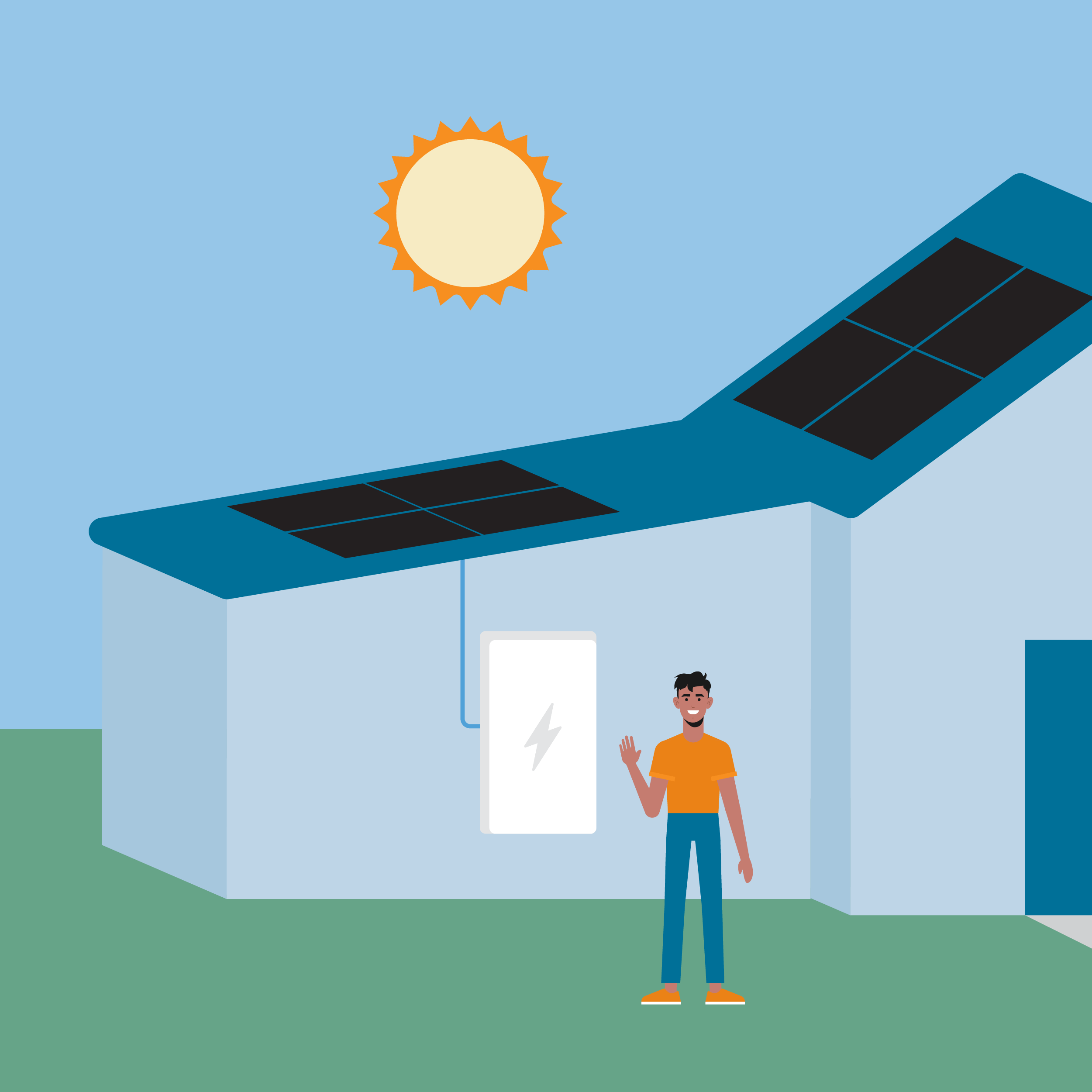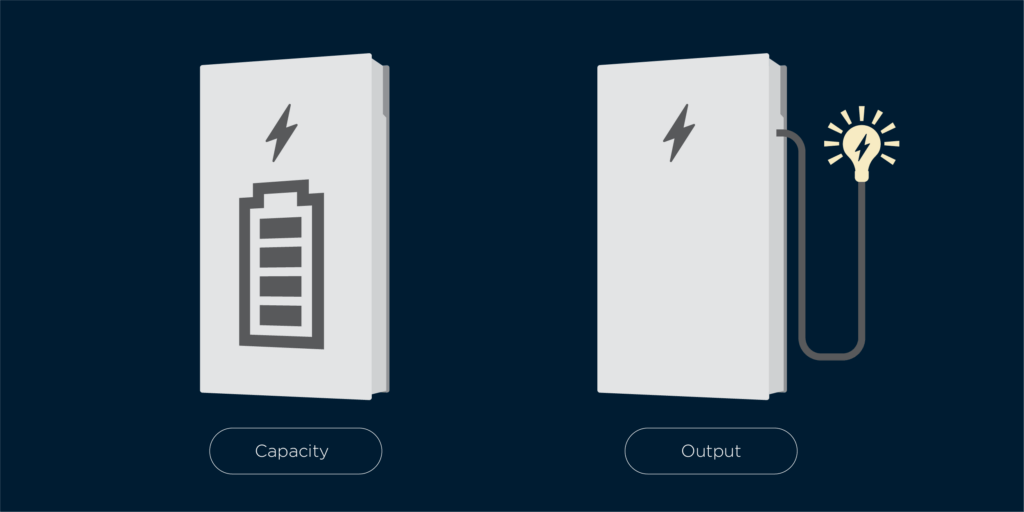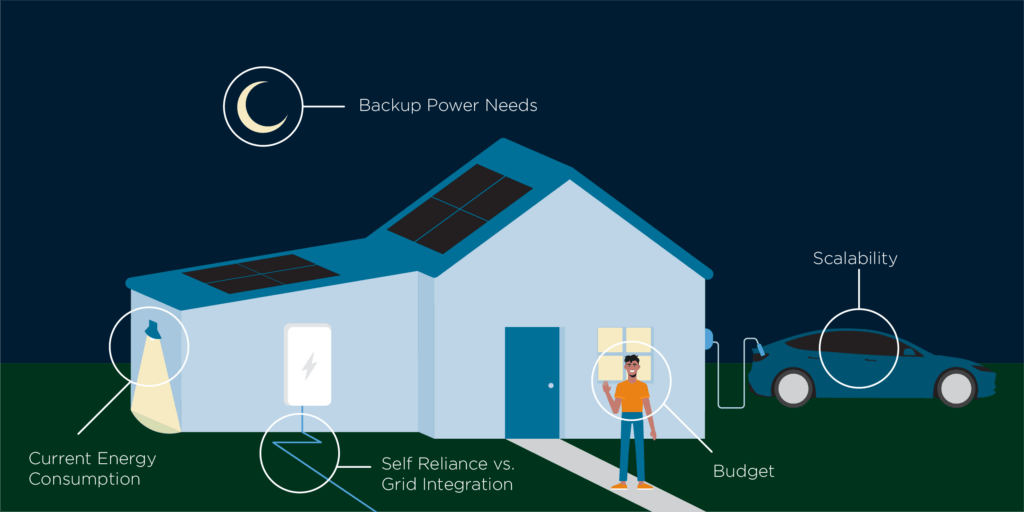
With rising traditional energy costs and growing concerns about environmental sustainability, solar power is becoming an increasingly attractive option for homeowners. However, without a way to store excess energy generated during the day, a solar panel system can only supply power for a limited amount of time. By utilizing a solar battery, you can maximize your solar power usage and enhance your home’s energy independence.
With many solar batteries available on the market, choosing the best one for you and your home can be overwhelming. This guide will walk you through what you need, to make an informed decision and select the best option.

Understanding Solar Battery Basics
Before diving into specific features, it’s important to breakdown the fundamental elements of a solar battery. These batteries offer high efficiency, long lifespans, and deep discharge capabilities, making them equipped to store solar power.
When sizing a solar battery for your home, there are two key specifications to consider: capacity and power output.
- Capacity, measured in kilowatt-hours (kWh), represents the total amount of energy the battery can store.
- Power output, measured in kilowatts (kW), determines how quickly the battery can deliver the stored energy to the home.
Assess your current energy consumption patterns to determine the appropriate battery capacity. Consider factors like household size, peak energy demand, and desired backup duration during utility grid outages.
Learn more about the different batteries Blue Raven Solar offers.
Cost
The cost of a solar battery is an important factor to consider for homeowners. Over the past decade, prices of these devices have dropped considerably due to advancements in technology and increased production. As of 2024, the average cost of residential solar battery storage systems ranges from $8,500 to $14,000, including installation costs. Factors influencing these prices include the battery’s capacity, brand, technology type (such as lithium-ion vs. lead-acid), and any additional features like smart energy management systems.
Although solar batteries typically have a large investment, they can offer long-term savings and benefits. Programs, policies, and incentives can help reduce the initial cost of solar batteries. Solar batteries enable homeowners to store excess solar energy generated during the day for use at night or during power outages, enhancing energy independence and security.
Additionally, with net metering policies and incentives such as the Federal Investment Tax Credit (ITC), which is equal to 30% of the system cost, including installation and equipment, the financial barrier for adopting solar battery storage is further lowered.
Efficiency
Solar battery efficiency is crucial in determining the overall performance and cost-effectiveness of solar energy storage systems. Efficiency in this context refers to the round-trip efficiency, which measures the percentage of energy that can be retrieved from the battery compared to the amount of energy initially stored. Modern solar batteries, particularly those using lithium-ion technology, can offer round-trip efficiencies between 85% and 95%. This means for every kilowatt-hour (kWh) of energy stored, 85 to 95% can be used, with the remaining energy lost primarily as heat during the charge and discharge processes.
The efficiency of solar batteries is influenced by several factors including the type of battery, temperature conditions, depth of discharge, and battery age. Lithium-ion batteries are preferred for residential installations due to their higher efficiency, longer lifespan, and greater energy density compared to traditional lead-acid batteries, which typically have efficiencies around 70-80%. Optimal operating conditions are also crucial; batteries perform best within specific temperature ranges, as excessive heat or cold can diminish their effectiveness.

Warranties
Solar battery warranties are assurances providing consumers with peace of mind regarding performance and longevity. Typically, warranties for solar batteries cover two main aspects: capacity and lifespan.
- Capacity warranties guarantee the battery will maintain a certain percentage of its original storage capacity over a specified period.
- Lifespan warranties, however, ensure the battery will be operational and functional for a certain number of cycles or years. Some warranties also cover additional aspects such as workmanship and defects in materials or components.
Homeowners should carefully review the terms and conditions of solar battery warranties to understand the coverage, duration, and any conditions or limitations. A reliable solar battery warranty instills confidence in your investment and underscores the manufacturer’s commitment to quality and performance.
Capacity
Solar battery capacity refers to the amount of energy a battery can store and deliver for later use. It is typically measured in kilowatt-hours (kWh) and represents the total amount of energy the battery can hold. When selecting a solar energy storage system, it’s important to consider the capacity, as it determines how much energy can be stored during periods of sunlight and subsequently used during periods of low or no sunlight, such as at night or during cloudy days.
Larger capacity batteries can store more energy and provide greater backup power, but they also tend to be more expensive. Finding the right balance between capacity, cost, and energy needs is essential for maximizing the effectiveness and affordability of a solar energy storage system.
Lifespan
The lifespan of a solar battery is the duration the battery can reliably operate and retain its performance capabilities. When it comes to solar energy storage systems, it directly impacts the system’s long-term viability and return on investment. The lifespan of solar batteries can vary. Common factors such as battery chemistry, usage patterns, maintenance, and environmental conditions can impact their longevity.
Lithium-ion batteries, which are commonly used in solar energy storage systems, have lifespans ranging from 10 to 20 years or more, with some newer technologies promising longer durability. Lead-acid batteries, while more affordable, generally have shorter lifespans of 3-5 years. Proper maintenance and usage practices, such as avoiding deep discharges and keeping batteries within optimal temperature ranges, can help extend the lifespan.
Manufacturer
Solar battery manufacturers produce the essential components for energy storage systems. These companies specialize in designing, developing, and manufacturing a diverse array of batteries customized for solar energy applications. Some of the leading solar battery manufacturers include Tesla, LG Chem, Panasonic, and Franklin. These manufacturers use various battery chemistries, such as lithium-ion and lead-acid, each with its own advantages and limitations in terms of cost, efficiency, and lifespan.
Additionally, these manufacturers often invest heavily in research and development to improve battery performance, reduce costs, and introduce innovative features like smart energy management systems and utility grid integration capabilities.

Align Your Needs with the Best Battery for You
The best solar battery for your home depends on your energy consumption habits and future goals. Here are some key factors to consider:
- Current Energy Consumption: The first step is to assess your household’s daily and seasonal energy usage. Analyze your electricity bills to understand your average kilowatt-hour (kWh) consumption per day or month. This will give you a baseline for how much battery capacity you’ll need.
- Backup Power Needs: Do you prioritize complete blackout protection or are you looking to offset energy costs during peak hours? If complete backup power is your goal, you’ll need a solar battery with large capacity to power your essential household appliances during a power outage or emergency.
- Budget: Solar batteries are a large investment, and upfront costs can vary. Determine a realistic budget and choose a solar battery system and capacity that fits within those constraints.
- Scalability: Consider and project what your future energy needs will be. Will your consumption habits change significantly in the coming seasons or years? For example, some homeowners plan to install a hot tub, heat pump, or even an EV charger in the future. These are all additions increasing your current energy usage, and a custom rooftop solar panel system paired with a solar battery can help offset them. If you anticipate needing more power, some battery systems offer the ability to add additional battery packs for increased capacity.
- Self-Reliance vs. Grid Integration: Depending on your local regulations and energy goals, you may want a battery system that integrates seamlessly or, in rare cases, allows you to completely disconnect from the utility grid. Grid-tied battery systems can provide backup power during outages and allow you to sell excess solar energy back to the utility grid for credits on your electricity bill through net metering.
One Size Does Not Fit All
One-size-fits-all solar batteries can present challenges due to the diverse needs and contexts of solar energy systems. These batteries may suffer from mismatched capacity, failing to adequately store or supply energy for varying demands across different installations. Location-specific factors such as geography, weather patterns, and seasonal changes can affect the performance of these batteries, making them less efficient in certain areas.
Integrating such batteries into existing systems or infrastructure can pose compatibility issues and increase complexity and costs. As a result, customized or modular battery solutions can be adapted to specific applications, locations, and energy demands are often preferred, offering greater flexibility, efficiency, and cost-effectiveness in deploying solar energy storage systems.
Batteries Installed and Offered by Blue Raven Solar
At Blue Raven Solar, we help homeowners find the right solar battery—one that integrates seamlessly with their rooftop solar system, meets their energy needs, and offers reliability.
With our expertise in the latest solar technologies, we recommend efficient, cost-effective options tailored to your budget and energy goals. We prioritize transparency, providing the information you need to understand the benefits and potential savings of going solar and adding a solar battery to your system.
Contact us today to learn more and discover the best solar battery to power your home!



Sorry, the comment form is closed at this time.